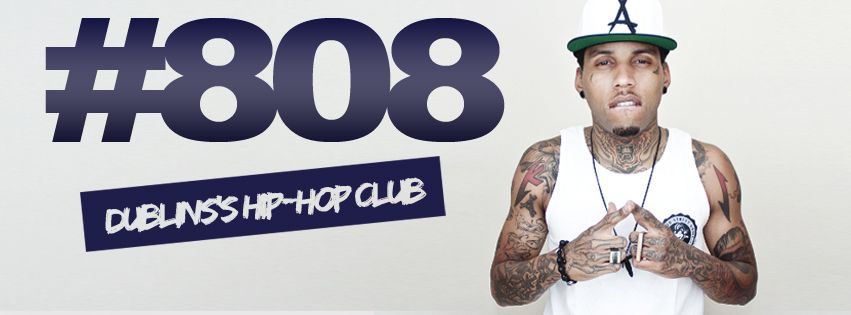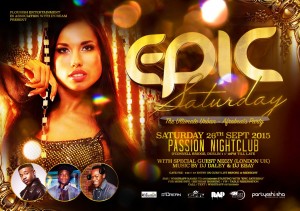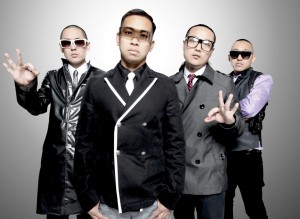 In a time of manufactured bands and reality TV success, Far East Movement are a throw-back to the old-school. Brought up on a diet of 90’s Hip-Hop, with a work ethic to hustle their way to the top, Far East Movement embody what it truly means to be an artist; uncompromising in your music and unrelenting in your drive. FM make no apologies if their music seems mainstream or party music. They point to the origins of Hip-Hop and the block party scene to show they are simply a modern manifestation of that early spirit. With hits such as Like a G6 and Turn Up the Love making the group a household name, Rap Ireland decided to take them back, way back, before the fame and fortune to what went into the group to make them what they are today.
In a time of manufactured bands and reality TV success, Far East Movement are a throw-back to the old-school. Brought up on a diet of 90’s Hip-Hop, with a work ethic to hustle their way to the top, Far East Movement embody what it truly means to be an artist; uncompromising in your music and unrelenting in your drive. FM make no apologies if their music seems mainstream or party music. They point to the origins of Hip-Hop and the block party scene to show they are simply a modern manifestation of that early spirit. With hits such as Like a G6 and Turn Up the Love making the group a household name, Rap Ireland decided to take them back, way back, before the fame and fortune to what went into the group to make them what they are today.
Kev Storrs (KS): To get it started guys I want to rewind a bit. A lot of artists I’ve interviewed have talked about not being an overnight successes, or as Yelawolf put it, “it takes 10 years to be an overnight success”. So I wanted to go back even before your music was featured in movies or you began climbing the Billboard charts. What was it that you were doing back then that made you stand out from everyone else trying to make it?
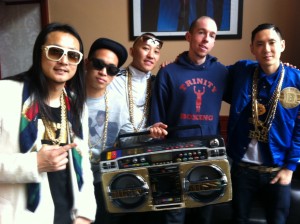 Far East Movement (FM):Well, first off, shout out to Yelawolf if you’re reading; he’s a good dude. For us, I think what stood out was that we’re very persistent. From the start we were crazy about it. We would record these songs on our computer at home and write our email address and phone number on it and just burn CDs all night with the money we saved up. We would walk around L.A all day, handing out CDs like “Check this out, Check this out, listen to our music”. We were so persistent. We would literally show up at every club. We’d always be at the club Vermin was playing in L.A and be passing CDs to every DJ we met. All of a sudden people started being like “Oh, I’ve heard of them”. I think it’s that persistence and faith more than anything. But before you find your sound, before you find your identity, before you even know your logo, it’s about having the drive and persistence to go out and go the extra mile. Be willing to stay up all night on your Facebook, or back in the day on your Myspace, messaging everybody saying Check out my music, that’s the kind of thing that will create your next opportunity.
Far East Movement (FM):Well, first off, shout out to Yelawolf if you’re reading; he’s a good dude. For us, I think what stood out was that we’re very persistent. From the start we were crazy about it. We would record these songs on our computer at home and write our email address and phone number on it and just burn CDs all night with the money we saved up. We would walk around L.A all day, handing out CDs like “Check this out, Check this out, listen to our music”. We were so persistent. We would literally show up at every club. We’d always be at the club Vermin was playing in L.A and be passing CDs to every DJ we met. All of a sudden people started being like “Oh, I’ve heard of them”. I think it’s that persistence and faith more than anything. But before you find your sound, before you find your identity, before you even know your logo, it’s about having the drive and persistence to go out and go the extra mile. Be willing to stay up all night on your Facebook, or back in the day on your Myspace, messaging everybody saying Check out my music, that’s the kind of thing that will create your next opportunity.
KS: So how long did it take for people to realize that you weren’t just like every other artist out there hustling their music? How long before people recognized that there was actually some real talent there?
FM: We looked at it as a three-pronged attack. One, they saw your CD – they threw it away. But that was just one impression. Second, they see a myspace blast or something – they say ‘oh, that sounds familiar’. Then third is maybe a flyer. So by then they’re like “I’ve heard of this group!”. It’s imprinted on them, and at that point they might just listen to the music and be like the sound is different, it’s alright, I like it. Then we finally get a song on the radio, and when we do people are like ‘ Dude I know this group, they’re from L.A, they’ve been around.’ As you know from talking to them it’s the same way LMFAO did it. It’s all about building and the culmination of different approaches.
KS: You mentioned Myspace there, and one thing I noticed about you guys is that you didn’t go with the spammy approach, there was a lot more genuine interaction there than is usually the case with artists. What was your general approach to social media?
FM: Definitely. For us, we always made sure we personally commented and messaged everyone individually who added us. The way we looked at that was, imagine we had a gig and after the show we walked out into the crowd and personally shook hands with everyone. That’s what the internet is. It’s real. If you treat it real, you’ll get a real reaction back. So it was cool when people were like, oh you actually responded back. And you start actually talking and getting to know people. So they’re like ‘let me know when you next have a show’ or ‘let me know when you next have a song’. That’s love. And it’s really genuine.
KS: That’s a priceless database to have…
FM: Precisely. Active engaged fans. And that’s even working to some degree right up until today. Take Dublin for example. We were seeing tweets from people in Dublin saying they wanted to see a FM show out here. We made sure to reach out to all those people and establish a genuine connection. So what was so exciting was that we were able to talk to the fans before we even came here.
KS: And by talking with them, they are much more motivated to come and see you in concert…
FM: Exactly, but whether they do or don’t is ok. Even if it’s a small crowd, and Dublin will probably be intimate, it’s great for us to be able to vibe out. And we plan after the show to have a surprise meet and greet for all the fans to give back something.
KS: Another noticeable aspect of Far East Movement is that your music was featured in video games and on TV and movies long before you were ever a household name. That is the opposite of how it usually happens for groups. Was this a deliberate strategy you had, or did it come about by coincidence?
FM: No, well before we were signed there were really no opportunities, whether it was radio or anything, we had nothing. It actually came about by chance. We were burning a bunch of CDs in our place, and we were walking around LA handing them out and we happened to run into a guy who worked in TV and music placement for movies and TV. That person managed to get our music on a TV show and from there the CD started to circulate, because I guess it’s a small network of people that place music in TV and movies. So they were like yeah, it’s good and it’s cheap. We were new so it wasn’t that expensive, we were happy for them to be checking out the music. And slowly the movies would come and people would use our music. That comes once again just from drive, passion and persistence to keep handing it out to everybody. That one person you didn’t expect to come through came through. Came through big!
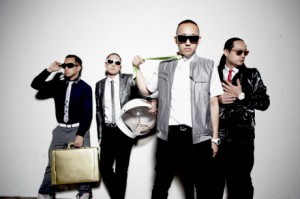 KS: On the branding front you guys have focused very strongly on “Far East Movement” the group and not on the individual members. Was that something you originally had in mind, or was it a result of the sharp success curve once your tracks started charting?
KS: On the branding front you guys have focused very strongly on “Far East Movement” the group and not on the individual members. Was that something you originally had in mind, or was it a result of the sharp success curve once your tracks started charting?
FM: Yeah you got it. From a branding perspective, the “Far East Movement” has always been heavily influenced by lifestyle and we wanted the brand to convey that lifestyle. That comes down to everything from designing our clothing to the chains we’re wearing right now. For the “Dirty Bass” album we were heavily influenced by the classic 90’s Hip-Hop style, with the boom boxes, the LL Cool J type chains. If we were to do that individually it wouldn’t be enough to convey that lifestyle or culture, so focusing the branding under the Far East Movement lifestyle works much better. Just on an aside, that was the type of music we grew up on, the likes of Beastie Boys. While it might not necessarily be our era, it was the music we listened to, we would search it out. So now when people say about ‘Party Rock’ or ‘Dirty Bass’, saying we’re just making party music, we point them back to that era. That’s exactly what Beastie Boys were doing. They were the original party MCs! So yeah, we try to wrap all that up into the Far East Movement brand.
KS: You spoke there about the music you grew up listening to. These days there seems to be a huge fusion going on between Hip-Hop, Rock and Electro, with a really hybrid sound coming out. It’s probably safe to say that you would fall into that category. With such rapid changes in the business, do you find that you need to keep an eye on musical trends and stay ahead of them with your own sound?
FM: We pay attention to the trends. We keep an eye on them to see what’s hot and also what’s already been done before. But we don’t think about the trends when we’re making something. When we’re in that creative space it’s all just about our own influences in music and doing what we love.
KS: You’ve been touring back to back for a while now. In Dublin the show is intimate, but you have been on the festival circuit all summer. Do you prefer the opportunity to perform to vast numbers of new potential fans at those festivals or the smaller fans-only shows?
FM: I think the small shows. The vibe is like up close and personal. It’s a different type of connection. We just did a festival in Latvia, that was fun too don’t get me wrong, but when you’re in front of that many people it’s hard to see an individual face. You can’t judge the reactions. It’s not as personal. At a small show you can see them singing the song or mouthing the words. It’s just a different type of experience. They’re both amazing. It’s the difference between having a conversation with a few people and speaking to 20,000.
KS: A lot of artists are saying at the moment that they need to stay on tour just to maintain an income and a cash flow. How do you guys balance that with putting out new music and getting creative. Do you still have time to get in the studio?
FM: We don’t. We didn’t. Especially with the Dirty Bass album. That started before we went on tour with Calvin Harris. Then we jumped on tour with Lil Wayne and Rick Ross. And we just didn’t have time to get in the studio. So what we had to do was take our laptops and microphones with us and we’d use them in motels and basically set up the microphone in the shower and use the bathroom as a recording studio and basically make music like that. That’s how we recorded half this album!
KS: That’s not the only non-conventional approach you have to music is it? You gave away your biggest hit to date, Like A G6, for free?
FM: Yeah! That was when we knew we were going on our first ever nationwide tour in the US, on LMFAO’s Party Rock tour. We were unsigned and got signed right off that tour. We were like LMFAO have an ill fan base, let’s give them free music and after that hopefully they’ll find something they like. And it was that tour that really made “Like A G6”. We gave it away for free and it seemed to speak to their lifestyle. The fans made it happen for that song. It charted on iTunes before it ever even went to radio. That shocked us, we were so surprised. It just showed the power that people really have to choose the music they like.
KS: It really turns the old record label mentality on it’s head.
FM: Absolutely. And that’s what inspired the label to pump marketing money into us. The power of the fans got us here so now our job is to return the love!
Rap Ireland would like to thank Far East Movement, their management and Universal Music for taking the time to speak with us.

